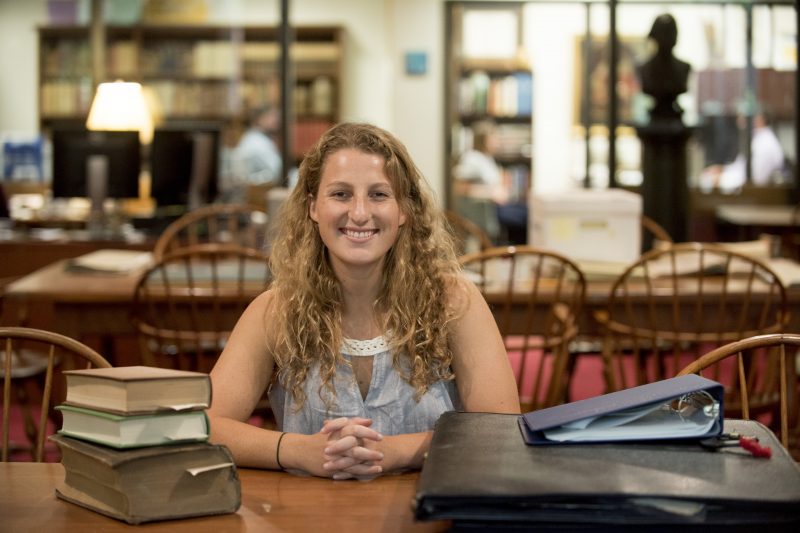A Special Summer in Special Collections Chandler Wickers '18 has spent her summer as a researcher in Special Collections, where she has been exposed to fascinating materials and learned how professors and students can take greater advantage of the collection.
“Washington and Lee has taught me how to research properly and how to invest myself in a long-term project and enjoy that process.”
— Chandler Wickers ’18
Hometown: Portola Valley, California
Major: English
Minor: Film Studies
Q. What are you doing for the summer?
I’m working in the Special Collections department for nine weeks as a summer research scholar. I want to develop a way for faculty to understand and utilize Special Collections resources in classrooms and research on a broader scale. I also want to give more students the opportunity to engage with Special Collections during their careers as undergraduates.
Through this project, I am reviewing and analyzing data from a needs assessment survey that evaluates faculty curricular and research needs and desired format of implemented collection materials. I am surveying collections to determine useful materials, which include topical artifacts and thematic pieces, and preparing research on these materials.
Through this process, I am learning about metadata, survey analysis and website development, and I am browsing existing archival instructional toolkits with the goal of developing and presenting my own product of collection resources and suggested learning outcomes on the web platform Omeka. This product will be a showcase of archival material translated onto a digital platform, as well as conclusions from my survey. This will be an accessible resource for Washington and Lee faculty and students, as well as the Special Collections department, all of whom will directly benefit from an exhibit of otherwise untapped materials.
Q. What does an average day for you look like?
There is no typical day for me, but the project involves researching and scanning collection materials, meeting with professors to assess their interest in utilizing materials, analyzing data from the survey, and developing exhibits for my Omeka site.
Q. What was the most interesting thing you learned while working on this project?
Just how rich and fascinating our collections are. I’m currently looking at a collection of a former W&L Journalism professor O.W Riegel, who was a propaganda expert and film buff. Along with an incredibly valuable WWII propaganda collection, he collected foreign film articles, posters and film festival ephemera from the mid-20th century. I get to look at these materials every day!
Sometimes it is small pockets of materials rather than an entire collection that are captivating. My dad’s side of the family is from Portugal, so it really sparked my interest when I got to look through the scrapbook collection of Charles Page Bryan, the U.S. Ambassador to Portugal from 1903-1909, who was capturing day-to-day life in Lisbon and Madeira right before the fall of the monarchy.
Q. What was the biggest challenge you faced?
I am beginning the process of creating my website on Omeka, which includes some technical work that I’m not used to. Metadata and copyright information is new to me but important in creating my final product.
Q. Have you had any mentors during this time?
Yes, and they’ve all been super helpful! I work with all the Special Collections staff, including Tom Camden, Seth McCormick-Goodhart, Byron Faidley and Lisa McCown. I am also teamed up with library specialists Emily Cook and Mackenzie Brooks.
Q. Has this experience impacted your studies or future plans in any way?
It’s definitely inspired me to continue researching. I’ve always enjoyed reading, and this project has expanded my awareness of W&L’s history and all the historical materials that are important to academia, specifically to an English major interested in 20th-century literature. I’ve also learned valuable lessons about digital humanities, and I hope to continue projects that relate to that field.
Q. How did W&L prepare you for this experience?
W&L has helped me become an efficient and creative critical thinker. I think a liberal arts education is beneficial in teaching me how to think in different ways and look at a problem from different angles. W&L also taught me how to research properly and how to invest myself in a long-term project and enjoy that process.
Q. Why is this kind of experience important to W&L students?
You have the opportunity to shape your own summer research, which is both valuable to the school and your own personal scholarly interests. I think any way of enhancing communication and collaboration between students and faculty is constructive, and ultimately something innovative will most always come out of that.
If you know any W&L students who would be great profile subjects, tell us about them! Nominate them for a web profile.
 Chandler Wickers poses in Special Collections at Leyburn Library, where she spent much of her summer conducting research.
Chandler Wickers poses in Special Collections at Leyburn Library, where she spent much of her summer conducting research.


You must be logged in to post a comment.